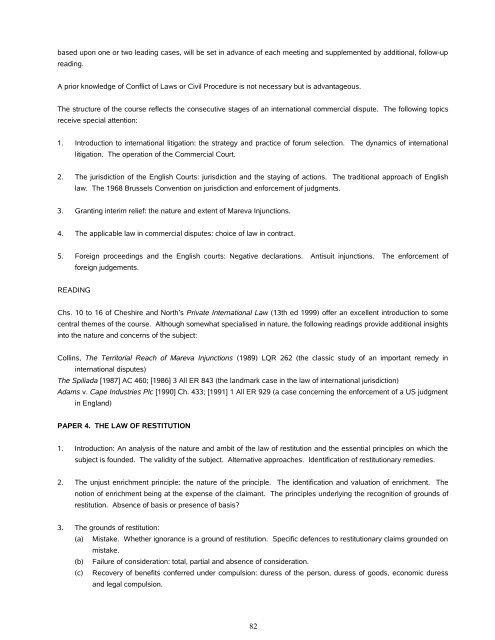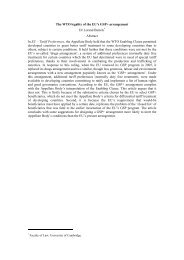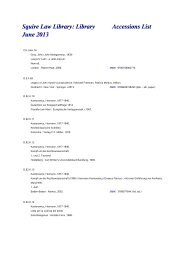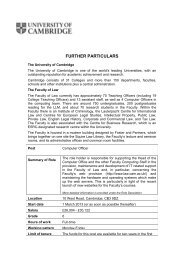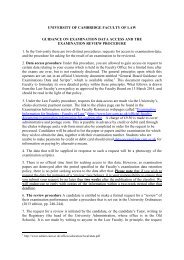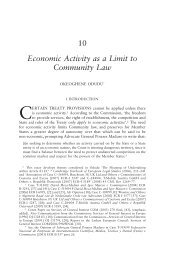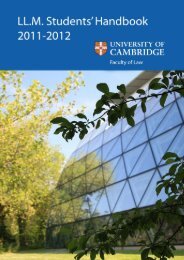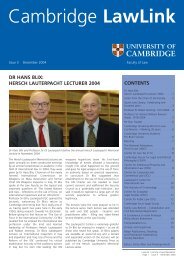Contents - Faculty of Law - University of Cambridge
Contents - Faculty of Law - University of Cambridge
Contents - Faculty of Law - University of Cambridge
You also want an ePaper? Increase the reach of your titles
YUMPU automatically turns print PDFs into web optimized ePapers that Google loves.
ased upon one or two leading cases, will be set in advance <strong>of</strong> each meeting and supplemented by additional, follow-upreading.A prior knowledge <strong>of</strong> Conflict <strong>of</strong> <strong>Law</strong>s or Civil Procedure is not necessary but is advantageous.The structure <strong>of</strong> the course reflects the consecutive stages <strong>of</strong> an international commercial dispute. The following topicsreceive special attention:1. Introduction to international litigation: the strategy and practice <strong>of</strong> forum selection. The dynamics <strong>of</strong> internationallitigation. The operation <strong>of</strong> the Commercial Court.2. The jurisdiction <strong>of</strong> the English Courts: jurisdiction and the staying <strong>of</strong> actions. The traditional approach <strong>of</strong> Englishlaw. The 1968 Brussels Convention on jurisdiction and enforcement <strong>of</strong> judgments.3. Granting interim relief: the nature and extent <strong>of</strong> Mareva Injunctions.4. The applicable law in commercial disputes: choice <strong>of</strong> law in contract.5. Foreign proceedings and the English courts: Negative declarations. Antisuit injunctions. The enforcement <strong>of</strong>foreign judgements.READINGChs. 10 to 16 <strong>of</strong> Cheshire and North’s Private International <strong>Law</strong> (13th ed 1999) <strong>of</strong>fer an excellent introduction to somecentral themes <strong>of</strong> the course. Although somewhat specialised in nature, the following readings provide additional insightsinto the nature and concerns <strong>of</strong> the subject:Collins, The Territorial Reach <strong>of</strong> Mareva Injunctions (1989) LQR 262 (the classic study <strong>of</strong> an important remedy ininternational disputes)The Spiliada [1987] AC 460; [1986] 3 All ER 843 (the landmark case in the law <strong>of</strong> international jurisdiction)Adams v. Cape Industries Plc [1990] Ch. 433; [1991] 1 All ER 929 (a case concerning the enforcement <strong>of</strong> a US judgmentin England)PAPER 4. THE LAW OF RESTITUTION1. Introduction: An analysis <strong>of</strong> the nature and ambit <strong>of</strong> the law <strong>of</strong> restitution and the essential principles on which thesubject is founded. The validity <strong>of</strong> the subject. Alternative approaches. Identification <strong>of</strong> restitutionary remedies.2. The unjust enrichment principle: the nature <strong>of</strong> the principle. The identification and valuation <strong>of</strong> enrichment. Thenotion <strong>of</strong> enrichment being at the expense <strong>of</strong> the claimant. The principles underlying the recognition <strong>of</strong> grounds <strong>of</strong>restitution. Absence <strong>of</strong> basis or presence <strong>of</strong> basis?3. The grounds <strong>of</strong> restitution:(a) Mistake. Whether ignorance is a ground <strong>of</strong> restitution. Specific defences to restitutionary claims grounded onmistake.(b) Failure <strong>of</strong> consideration: total, partial and absence <strong>of</strong> consideration.(c) Recovery <strong>of</strong> benefits conferred under compulsion: duress <strong>of</strong> the person, duress <strong>of</strong> goods, economic duressand legal compulsion.82


